Leadership and Management in Educational Contexts: AVID College Report
VerifiedAdded on 2023/05/30
|17
|4344
|395
Report
AI Summary
This report delves into the critical role of leadership and management within educational contexts, specifically focusing on a government school in the Maldives. It explores the significance of effective leadership, particularly the principal's influence, on student engagement and achievement. The report highlights the importance of leadership skills and management techniques for school principals, emphasizing the need to adapt to contemporary societal expectations. It analyzes various leadership models, including transformational, instructional, and transactional leadership, and their application in enhancing school management. Furthermore, the report provides insights into the dimensions of successful leadership traits, including defining values, improving teaching and learning conditions, and restructuring the organization. The study emphasizes the importance of leadership skills and models for promoting better student outcomes. The report uses research and articles by scholars to provide a comprehensive overview of the topic, including the importance of the principal as a leader.
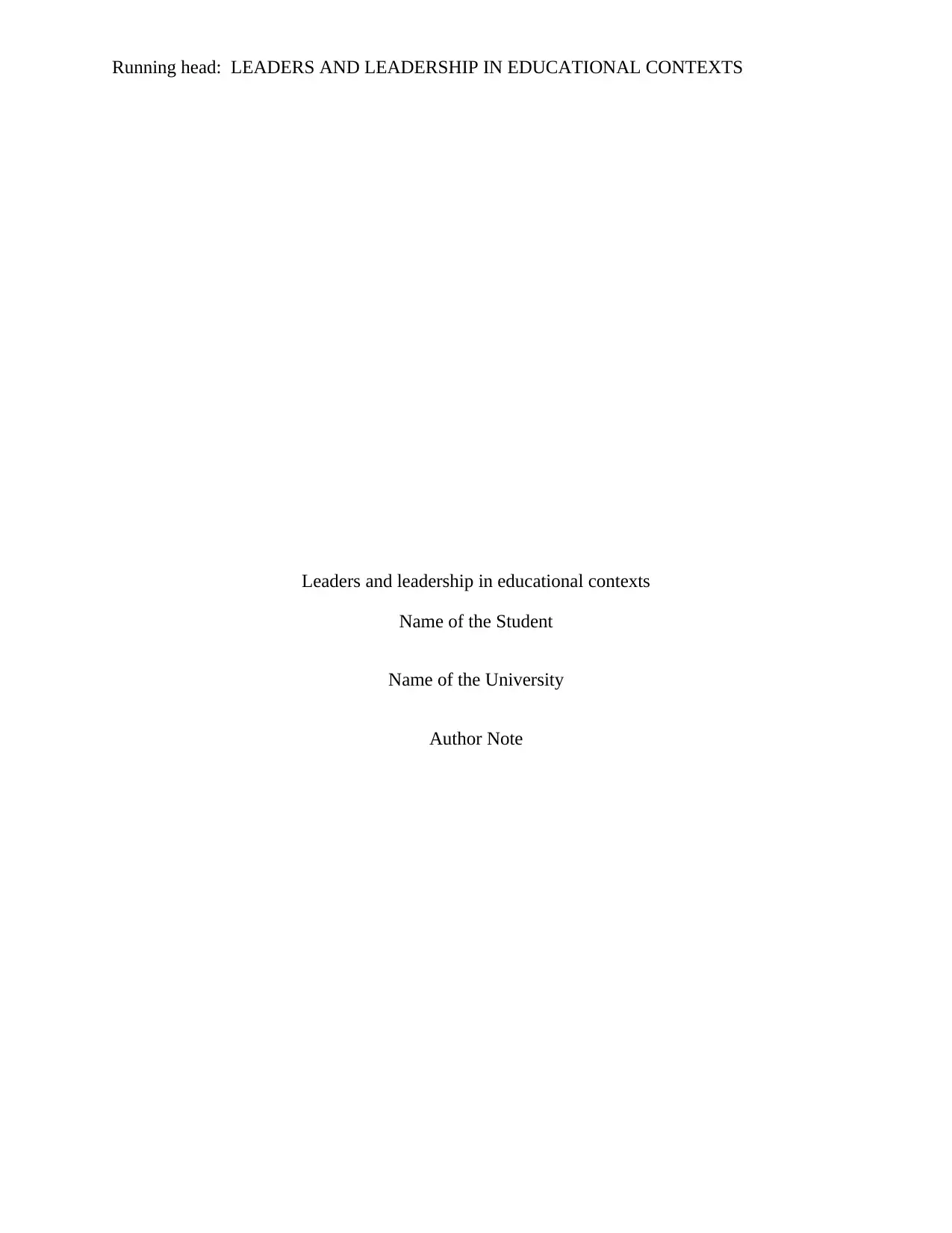
Running head: LEADERS AND LEADERSHIP IN EDUCATIONAL CONTEXTS
Leaders and leadership in educational contexts
Name of the Student
Name of the University
Author Note
Leaders and leadership in educational contexts
Name of the Student
Name of the University
Author Note
Paraphrase This Document
Need a fresh take? Get an instant paraphrase of this document with our AI Paraphraser
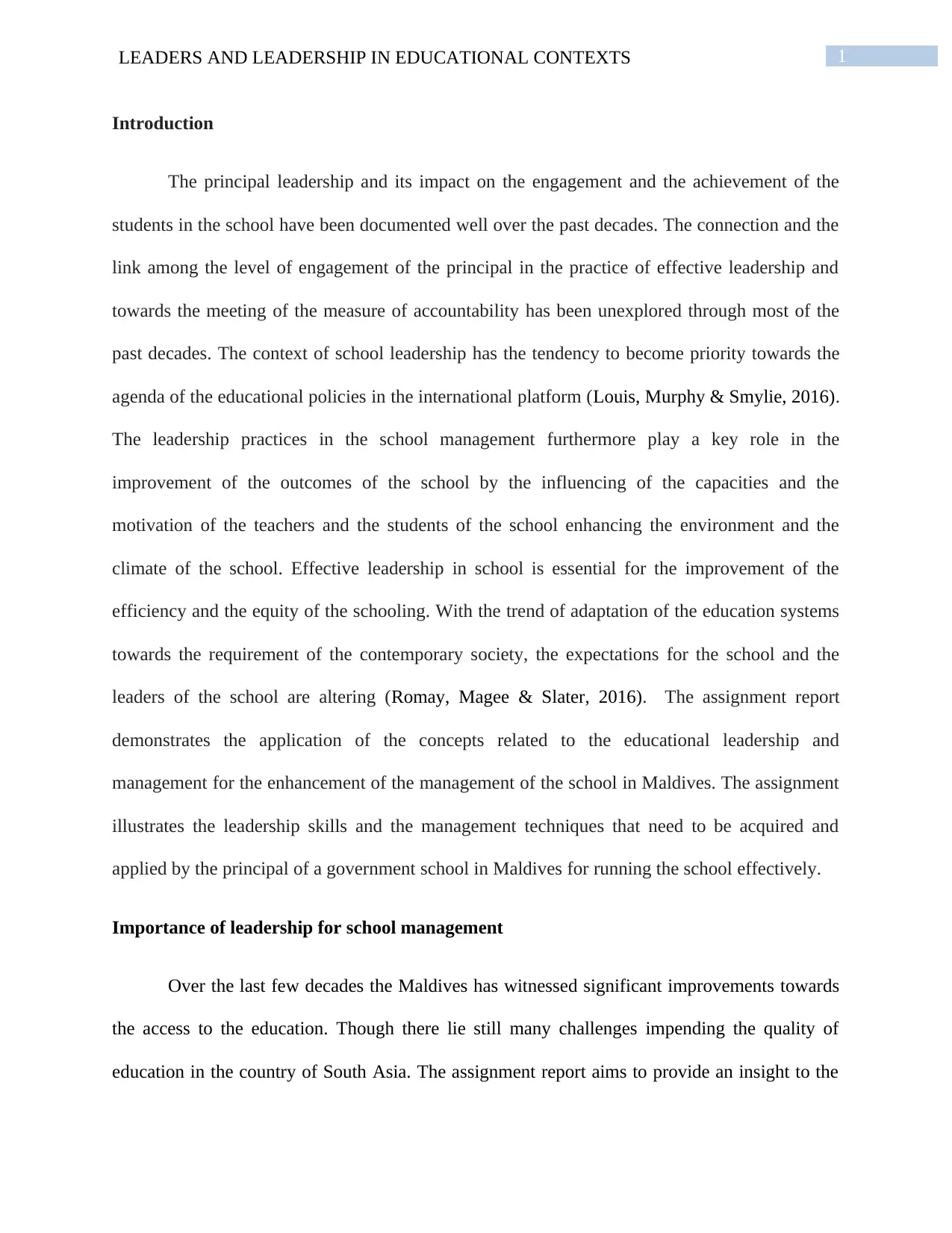
1LEADERS AND LEADERSHIP IN EDUCATIONAL CONTEXTS
Introduction
The principal leadership and its impact on the engagement and the achievement of the
students in the school have been documented well over the past decades. The connection and the
link among the level of engagement of the principal in the practice of effective leadership and
towards the meeting of the measure of accountability has been unexplored through most of the
past decades. The context of school leadership has the tendency to become priority towards the
agenda of the educational policies in the international platform (Louis, Murphy & Smylie, 2016).
The leadership practices in the school management furthermore play a key role in the
improvement of the outcomes of the school by the influencing of the capacities and the
motivation of the teachers and the students of the school enhancing the environment and the
climate of the school. Effective leadership in school is essential for the improvement of the
efficiency and the equity of the schooling. With the trend of adaptation of the education systems
towards the requirement of the contemporary society, the expectations for the school and the
leaders of the school are altering (Romay, Magee & Slater, 2016). The assignment report
demonstrates the application of the concepts related to the educational leadership and
management for the enhancement of the management of the school in Maldives. The assignment
illustrates the leadership skills and the management techniques that need to be acquired and
applied by the principal of a government school in Maldives for running the school effectively.
Importance of leadership for school management
Over the last few decades the Maldives has witnessed significant improvements towards
the access to the education. Though there lie still many challenges impending the quality of
education in the country of South Asia. The assignment report aims to provide an insight to the
Introduction
The principal leadership and its impact on the engagement and the achievement of the
students in the school have been documented well over the past decades. The connection and the
link among the level of engagement of the principal in the practice of effective leadership and
towards the meeting of the measure of accountability has been unexplored through most of the
past decades. The context of school leadership has the tendency to become priority towards the
agenda of the educational policies in the international platform (Louis, Murphy & Smylie, 2016).
The leadership practices in the school management furthermore play a key role in the
improvement of the outcomes of the school by the influencing of the capacities and the
motivation of the teachers and the students of the school enhancing the environment and the
climate of the school. Effective leadership in school is essential for the improvement of the
efficiency and the equity of the schooling. With the trend of adaptation of the education systems
towards the requirement of the contemporary society, the expectations for the school and the
leaders of the school are altering (Romay, Magee & Slater, 2016). The assignment report
demonstrates the application of the concepts related to the educational leadership and
management for the enhancement of the management of the school in Maldives. The assignment
illustrates the leadership skills and the management techniques that need to be acquired and
applied by the principal of a government school in Maldives for running the school effectively.
Importance of leadership for school management
Over the last few decades the Maldives has witnessed significant improvements towards
the access to the education. Though there lie still many challenges impending the quality of
education in the country of South Asia. The assignment report aims to provide an insight to the
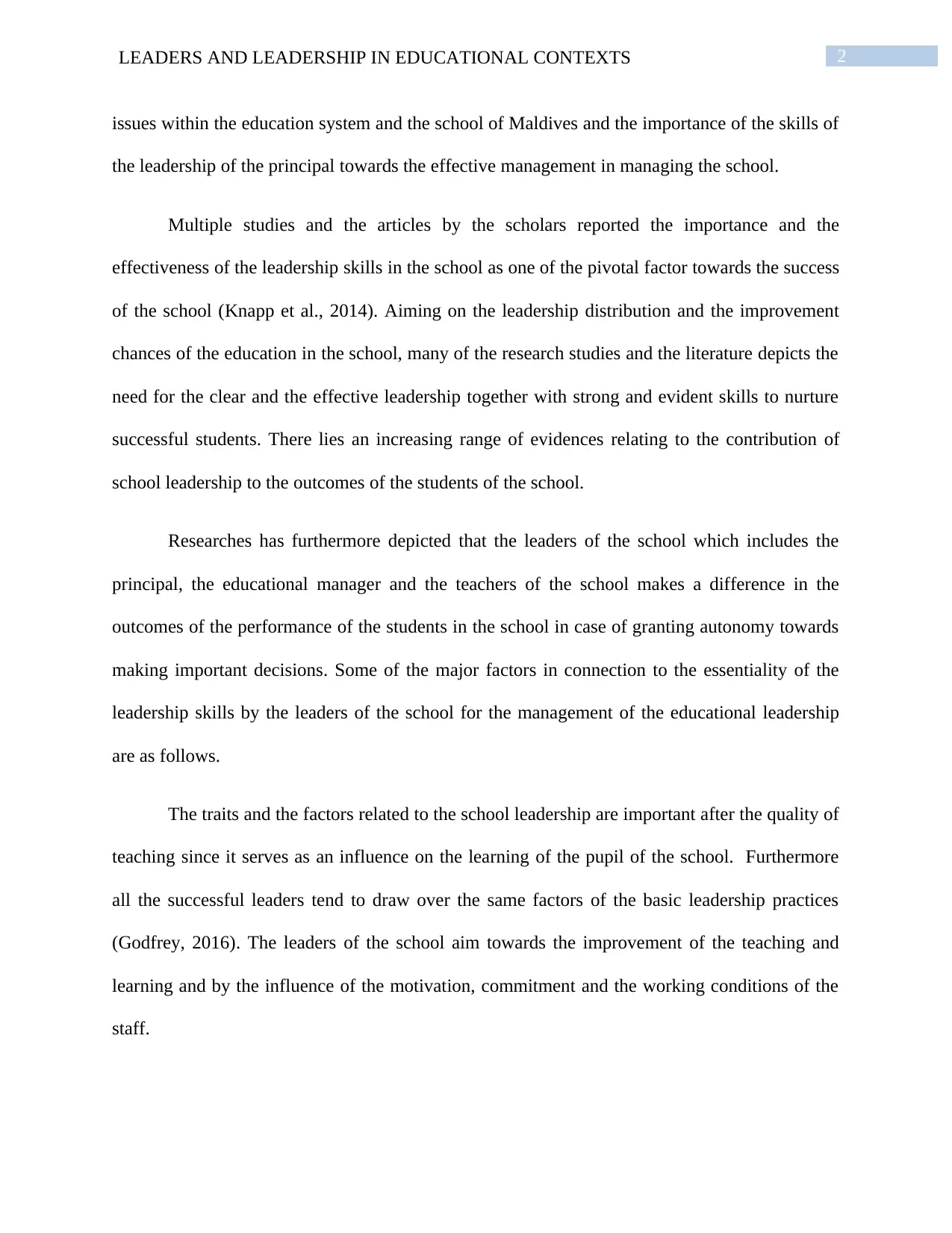
2LEADERS AND LEADERSHIP IN EDUCATIONAL CONTEXTS
issues within the education system and the school of Maldives and the importance of the skills of
the leadership of the principal towards the effective management in managing the school.
Multiple studies and the articles by the scholars reported the importance and the
effectiveness of the leadership skills in the school as one of the pivotal factor towards the success
of the school (Knapp et al., 2014). Aiming on the leadership distribution and the improvement
chances of the education in the school, many of the research studies and the literature depicts the
need for the clear and the effective leadership together with strong and evident skills to nurture
successful students. There lies an increasing range of evidences relating to the contribution of
school leadership to the outcomes of the students of the school.
Researches has furthermore depicted that the leaders of the school which includes the
principal, the educational manager and the teachers of the school makes a difference in the
outcomes of the performance of the students in the school in case of granting autonomy towards
making important decisions. Some of the major factors in connection to the essentiality of the
leadership skills by the leaders of the school for the management of the educational leadership
are as follows.
The traits and the factors related to the school leadership are important after the quality of
teaching since it serves as an influence on the learning of the pupil of the school. Furthermore
all the successful leaders tend to draw over the same factors of the basic leadership practices
(Godfrey, 2016). The leaders of the school aim towards the improvement of the teaching and
learning and by the influence of the motivation, commitment and the working conditions of the
staff.
issues within the education system and the school of Maldives and the importance of the skills of
the leadership of the principal towards the effective management in managing the school.
Multiple studies and the articles by the scholars reported the importance and the
effectiveness of the leadership skills in the school as one of the pivotal factor towards the success
of the school (Knapp et al., 2014). Aiming on the leadership distribution and the improvement
chances of the education in the school, many of the research studies and the literature depicts the
need for the clear and the effective leadership together with strong and evident skills to nurture
successful students. There lies an increasing range of evidences relating to the contribution of
school leadership to the outcomes of the students of the school.
Researches has furthermore depicted that the leaders of the school which includes the
principal, the educational manager and the teachers of the school makes a difference in the
outcomes of the performance of the students in the school in case of granting autonomy towards
making important decisions. Some of the major factors in connection to the essentiality of the
leadership skills by the leaders of the school for the management of the educational leadership
are as follows.
The traits and the factors related to the school leadership are important after the quality of
teaching since it serves as an influence on the learning of the pupil of the school. Furthermore
all the successful leaders tend to draw over the same factors of the basic leadership practices
(Godfrey, 2016). The leaders of the school aim towards the improvement of the teaching and
learning and by the influence of the motivation, commitment and the working conditions of the
staff.
⊘ This is a preview!⊘
Do you want full access?
Subscribe today to unlock all pages.

Trusted by 1+ million students worldwide
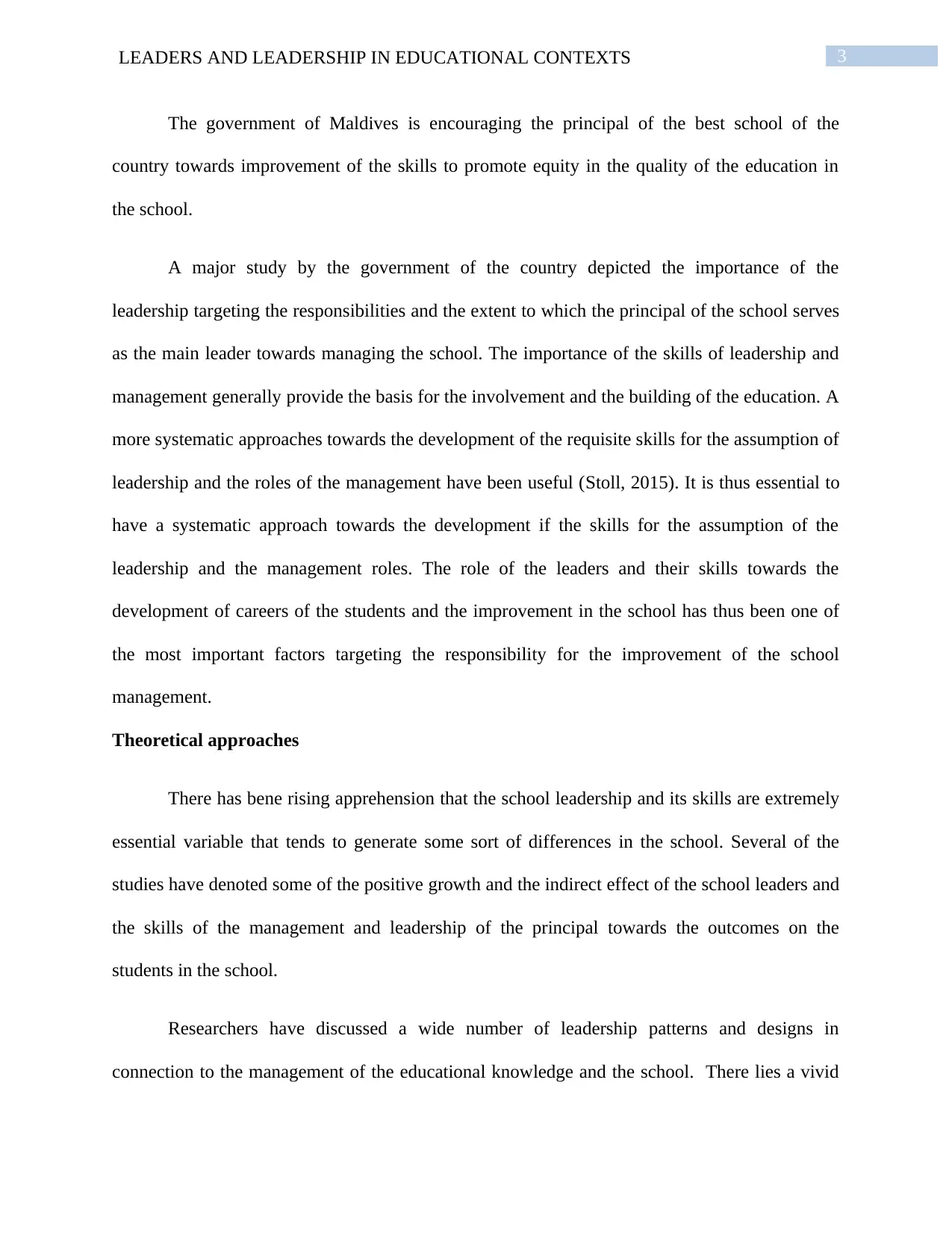
3LEADERS AND LEADERSHIP IN EDUCATIONAL CONTEXTS
The government of Maldives is encouraging the principal of the best school of the
country towards improvement of the skills to promote equity in the quality of the education in
the school.
A major study by the government of the country depicted the importance of the
leadership targeting the responsibilities and the extent to which the principal of the school serves
as the main leader towards managing the school. The importance of the skills of leadership and
management generally provide the basis for the involvement and the building of the education. A
more systematic approaches towards the development of the requisite skills for the assumption of
leadership and the roles of the management have been useful (Stoll, 2015). It is thus essential to
have a systematic approach towards the development if the skills for the assumption of the
leadership and the management roles. The role of the leaders and their skills towards the
development of careers of the students and the improvement in the school has thus been one of
the most important factors targeting the responsibility for the improvement of the school
management.
Theoretical approaches
There has bene rising apprehension that the school leadership and its skills are extremely
essential variable that tends to generate some sort of differences in the school. Several of the
studies have denoted some of the positive growth and the indirect effect of the school leaders and
the skills of the management and leadership of the principal towards the outcomes on the
students in the school.
Researchers have discussed a wide number of leadership patterns and designs in
connection to the management of the educational knowledge and the school. There lies a vivid
The government of Maldives is encouraging the principal of the best school of the
country towards improvement of the skills to promote equity in the quality of the education in
the school.
A major study by the government of the country depicted the importance of the
leadership targeting the responsibilities and the extent to which the principal of the school serves
as the main leader towards managing the school. The importance of the skills of leadership and
management generally provide the basis for the involvement and the building of the education. A
more systematic approaches towards the development of the requisite skills for the assumption of
leadership and the roles of the management have been useful (Stoll, 2015). It is thus essential to
have a systematic approach towards the development if the skills for the assumption of the
leadership and the management roles. The role of the leaders and their skills towards the
development of careers of the students and the improvement in the school has thus been one of
the most important factors targeting the responsibility for the improvement of the school
management.
Theoretical approaches
There has bene rising apprehension that the school leadership and its skills are extremely
essential variable that tends to generate some sort of differences in the school. Several of the
studies have denoted some of the positive growth and the indirect effect of the school leaders and
the skills of the management and leadership of the principal towards the outcomes on the
students in the school.
Researchers have discussed a wide number of leadership patterns and designs in
connection to the management of the educational knowledge and the school. There lies a vivid
Paraphrase This Document
Need a fresh take? Get an instant paraphrase of this document with our AI Paraphraser
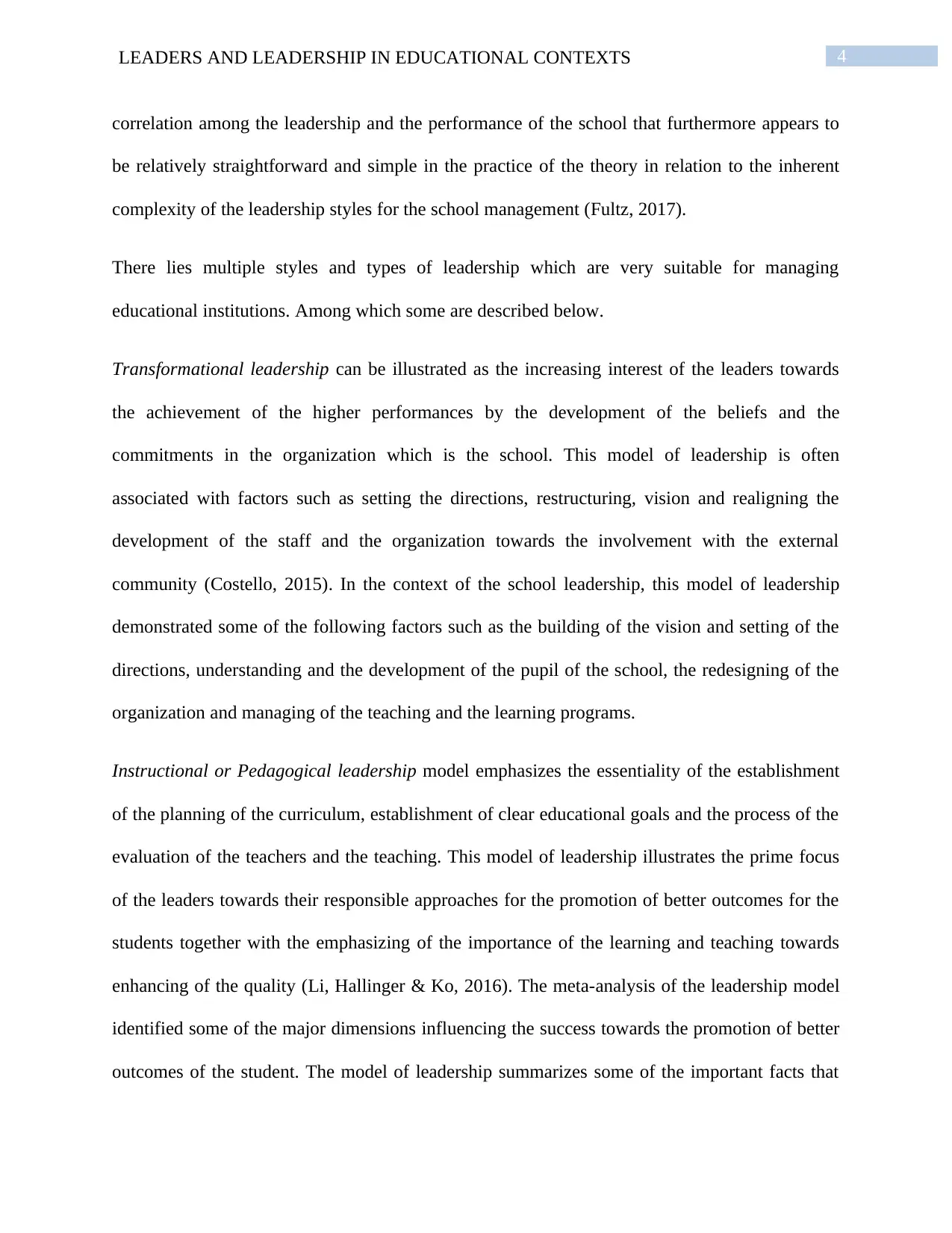
4LEADERS AND LEADERSHIP IN EDUCATIONAL CONTEXTS
correlation among the leadership and the performance of the school that furthermore appears to
be relatively straightforward and simple in the practice of the theory in relation to the inherent
complexity of the leadership styles for the school management (Fultz, 2017).
There lies multiple styles and types of leadership which are very suitable for managing
educational institutions. Among which some are described below.
Transformational leadership can be illustrated as the increasing interest of the leaders towards
the achievement of the higher performances by the development of the beliefs and the
commitments in the organization which is the school. This model of leadership is often
associated with factors such as setting the directions, restructuring, vision and realigning the
development of the staff and the organization towards the involvement with the external
community (Costello, 2015). In the context of the school leadership, this model of leadership
demonstrated some of the following factors such as the building of the vision and setting of the
directions, understanding and the development of the pupil of the school, the redesigning of the
organization and managing of the teaching and the learning programs.
Instructional or Pedagogical leadership model emphasizes the essentiality of the establishment
of the planning of the curriculum, establishment of clear educational goals and the process of the
evaluation of the teachers and the teaching. This model of leadership illustrates the prime focus
of the leaders towards their responsible approaches for the promotion of better outcomes for the
students together with the emphasizing of the importance of the learning and teaching towards
enhancing of the quality (Li, Hallinger & Ko, 2016). The meta-analysis of the leadership model
identified some of the major dimensions influencing the success towards the promotion of better
outcomes of the student. The model of leadership summarizes some of the important facts that
correlation among the leadership and the performance of the school that furthermore appears to
be relatively straightforward and simple in the practice of the theory in relation to the inherent
complexity of the leadership styles for the school management (Fultz, 2017).
There lies multiple styles and types of leadership which are very suitable for managing
educational institutions. Among which some are described below.
Transformational leadership can be illustrated as the increasing interest of the leaders towards
the achievement of the higher performances by the development of the beliefs and the
commitments in the organization which is the school. This model of leadership is often
associated with factors such as setting the directions, restructuring, vision and realigning the
development of the staff and the organization towards the involvement with the external
community (Costello, 2015). In the context of the school leadership, this model of leadership
demonstrated some of the following factors such as the building of the vision and setting of the
directions, understanding and the development of the pupil of the school, the redesigning of the
organization and managing of the teaching and the learning programs.
Instructional or Pedagogical leadership model emphasizes the essentiality of the establishment
of the planning of the curriculum, establishment of clear educational goals and the process of the
evaluation of the teachers and the teaching. This model of leadership illustrates the prime focus
of the leaders towards their responsible approaches for the promotion of better outcomes for the
students together with the emphasizing of the importance of the learning and teaching towards
enhancing of the quality (Li, Hallinger & Ko, 2016). The meta-analysis of the leadership model
identified some of the major dimensions influencing the success towards the promotion of better
outcomes of the student. The model of leadership summarizes some of the important facts that
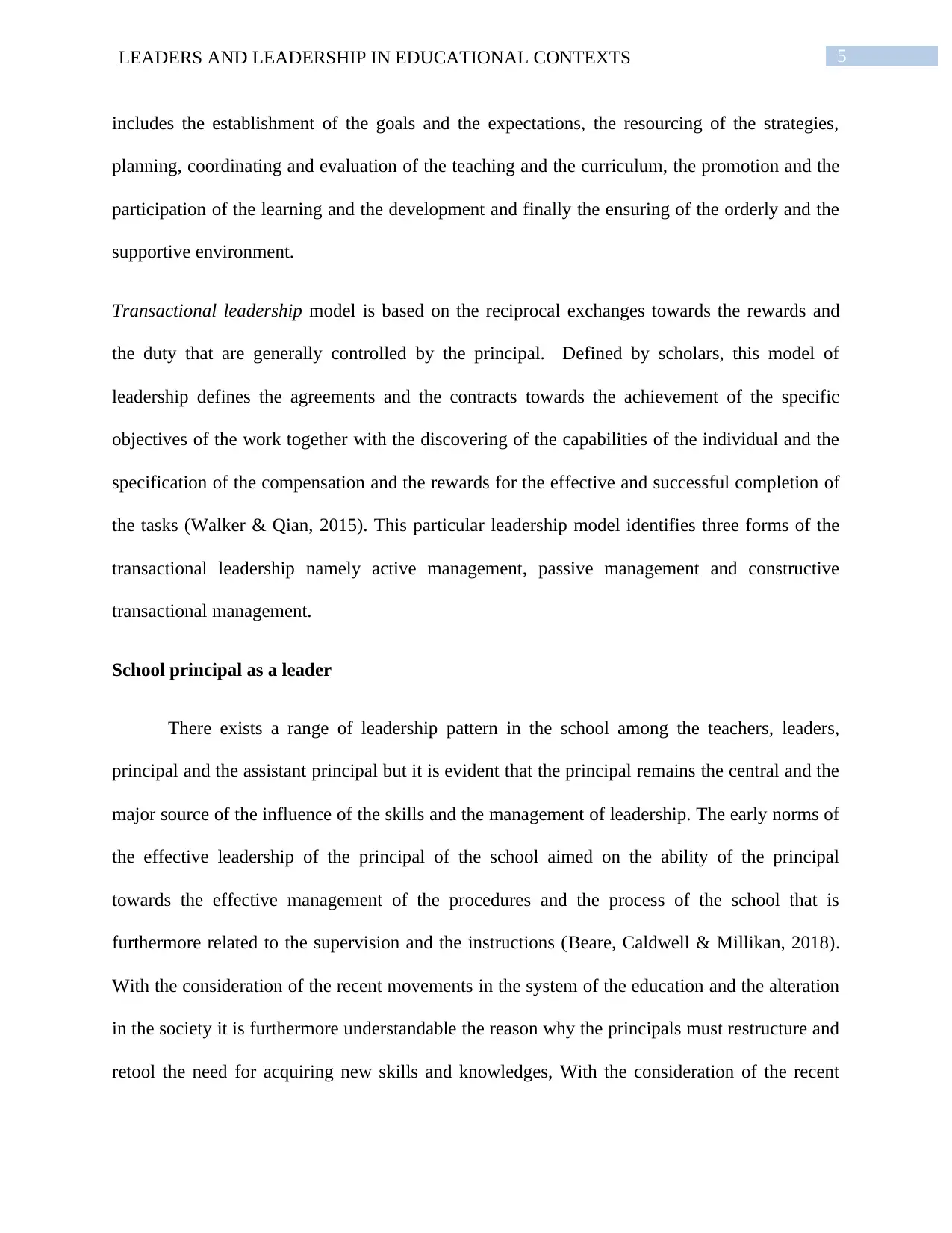
5LEADERS AND LEADERSHIP IN EDUCATIONAL CONTEXTS
includes the establishment of the goals and the expectations, the resourcing of the strategies,
planning, coordinating and evaluation of the teaching and the curriculum, the promotion and the
participation of the learning and the development and finally the ensuring of the orderly and the
supportive environment.
Transactional leadership model is based on the reciprocal exchanges towards the rewards and
the duty that are generally controlled by the principal. Defined by scholars, this model of
leadership defines the agreements and the contracts towards the achievement of the specific
objectives of the work together with the discovering of the capabilities of the individual and the
specification of the compensation and the rewards for the effective and successful completion of
the tasks (Walker & Qian, 2015). This particular leadership model identifies three forms of the
transactional leadership namely active management, passive management and constructive
transactional management.
School principal as a leader
There exists a range of leadership pattern in the school among the teachers, leaders,
principal and the assistant principal but it is evident that the principal remains the central and the
major source of the influence of the skills and the management of leadership. The early norms of
the effective leadership of the principal of the school aimed on the ability of the principal
towards the effective management of the procedures and the process of the school that is
furthermore related to the supervision and the instructions (Beare, Caldwell & Millikan, 2018).
With the consideration of the recent movements in the system of the education and the alteration
in the society it is furthermore understandable the reason why the principals must restructure and
retool the need for acquiring new skills and knowledges, With the consideration of the recent
includes the establishment of the goals and the expectations, the resourcing of the strategies,
planning, coordinating and evaluation of the teaching and the curriculum, the promotion and the
participation of the learning and the development and finally the ensuring of the orderly and the
supportive environment.
Transactional leadership model is based on the reciprocal exchanges towards the rewards and
the duty that are generally controlled by the principal. Defined by scholars, this model of
leadership defines the agreements and the contracts towards the achievement of the specific
objectives of the work together with the discovering of the capabilities of the individual and the
specification of the compensation and the rewards for the effective and successful completion of
the tasks (Walker & Qian, 2015). This particular leadership model identifies three forms of the
transactional leadership namely active management, passive management and constructive
transactional management.
School principal as a leader
There exists a range of leadership pattern in the school among the teachers, leaders,
principal and the assistant principal but it is evident that the principal remains the central and the
major source of the influence of the skills and the management of leadership. The early norms of
the effective leadership of the principal of the school aimed on the ability of the principal
towards the effective management of the procedures and the process of the school that is
furthermore related to the supervision and the instructions (Beare, Caldwell & Millikan, 2018).
With the consideration of the recent movements in the system of the education and the alteration
in the society it is furthermore understandable the reason why the principals must restructure and
retool the need for acquiring new skills and knowledges, With the consideration of the recent
⊘ This is a preview!⊘
Do you want full access?
Subscribe today to unlock all pages.

Trusted by 1+ million students worldwide
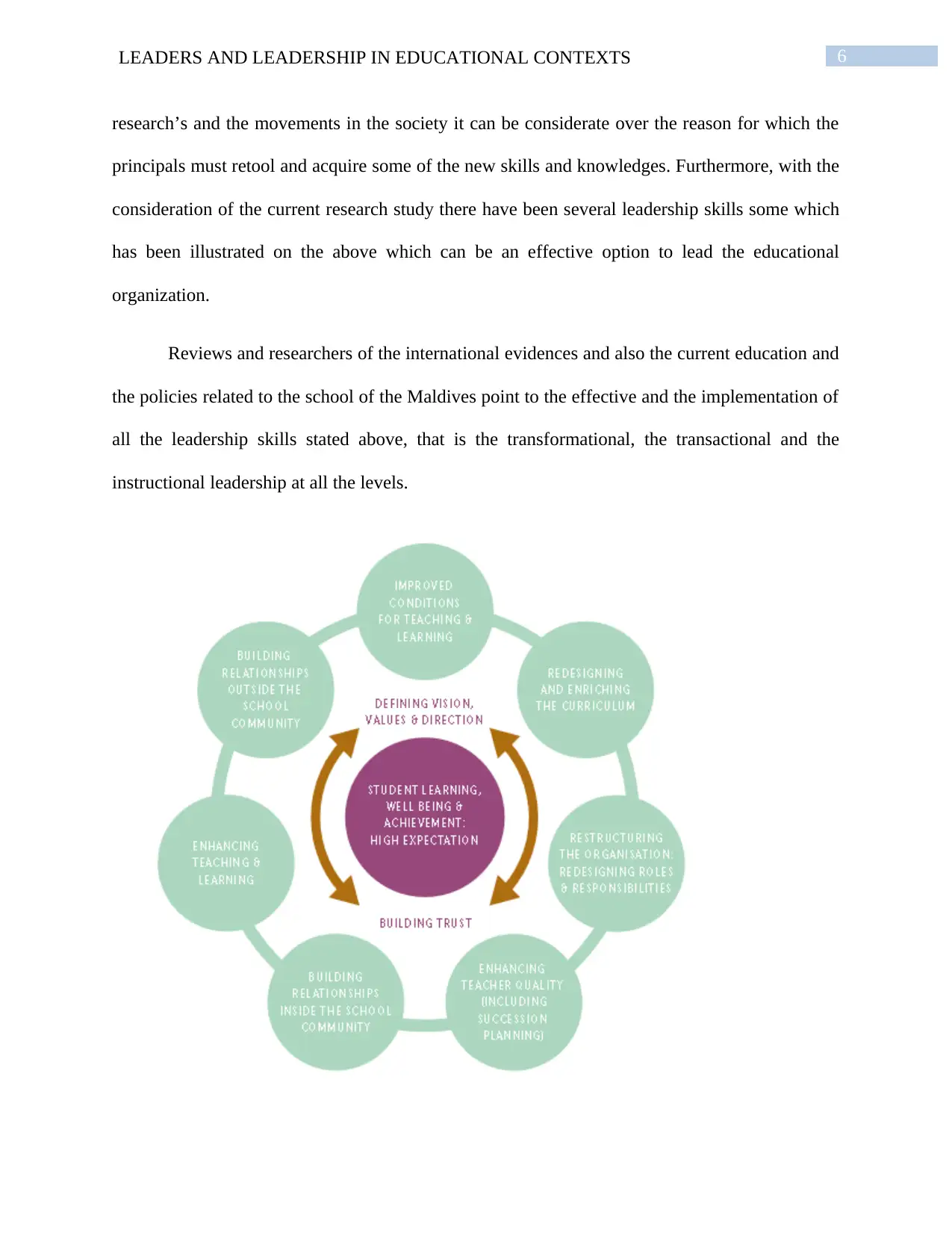
6LEADERS AND LEADERSHIP IN EDUCATIONAL CONTEXTS
research’s and the movements in the society it can be considerate over the reason for which the
principals must retool and acquire some of the new skills and knowledges. Furthermore, with the
consideration of the current research study there have been several leadership skills some which
has been illustrated on the above which can be an effective option to lead the educational
organization.
Reviews and researchers of the international evidences and also the current education and
the policies related to the school of the Maldives point to the effective and the implementation of
all the leadership skills stated above, that is the transformational, the transactional and the
instructional leadership at all the levels.
research’s and the movements in the society it can be considerate over the reason for which the
principals must retool and acquire some of the new skills and knowledges. Furthermore, with the
consideration of the current research study there have been several leadership skills some which
has been illustrated on the above which can be an effective option to lead the educational
organization.
Reviews and researchers of the international evidences and also the current education and
the policies related to the school of the Maldives point to the effective and the implementation of
all the leadership skills stated above, that is the transformational, the transactional and the
instructional leadership at all the levels.
Paraphrase This Document
Need a fresh take? Get an instant paraphrase of this document with our AI Paraphraser
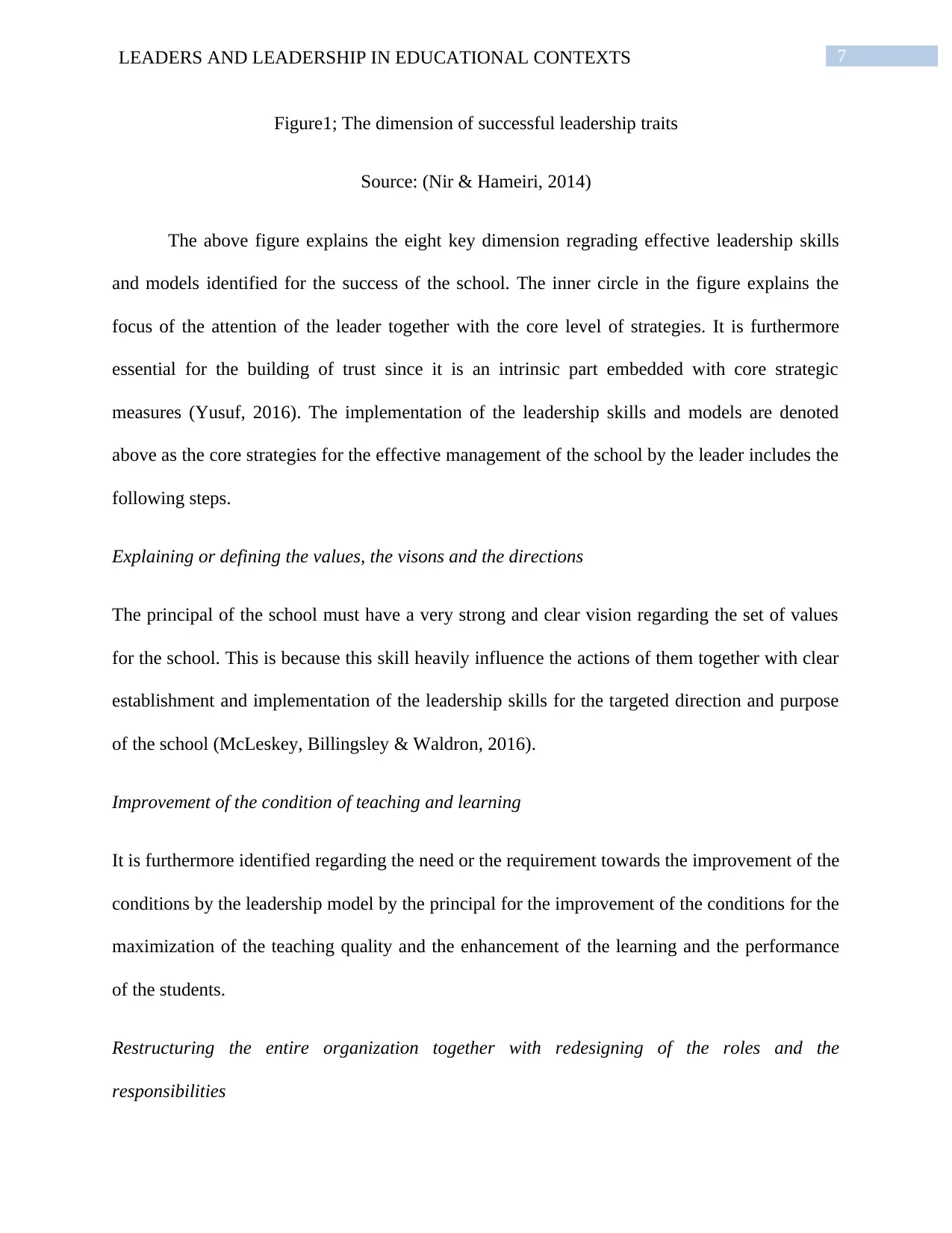
7LEADERS AND LEADERSHIP IN EDUCATIONAL CONTEXTS
Figure1; The dimension of successful leadership traits
Source: (Nir & Hameiri, 2014)
The above figure explains the eight key dimension regrading effective leadership skills
and models identified for the success of the school. The inner circle in the figure explains the
focus of the attention of the leader together with the core level of strategies. It is furthermore
essential for the building of trust since it is an intrinsic part embedded with core strategic
measures (Yusuf, 2016). The implementation of the leadership skills and models are denoted
above as the core strategies for the effective management of the school by the leader includes the
following steps.
Explaining or defining the values, the visons and the directions
The principal of the school must have a very strong and clear vision regarding the set of values
for the school. This is because this skill heavily influence the actions of them together with clear
establishment and implementation of the leadership skills for the targeted direction and purpose
of the school (McLeskey, Billingsley & Waldron, 2016).
Improvement of the condition of teaching and learning
It is furthermore identified regarding the need or the requirement towards the improvement of the
conditions by the leadership model by the principal for the improvement of the conditions for the
maximization of the teaching quality and the enhancement of the learning and the performance
of the students.
Restructuring the entire organization together with redesigning of the roles and the
responsibilities
Figure1; The dimension of successful leadership traits
Source: (Nir & Hameiri, 2014)
The above figure explains the eight key dimension regrading effective leadership skills
and models identified for the success of the school. The inner circle in the figure explains the
focus of the attention of the leader together with the core level of strategies. It is furthermore
essential for the building of trust since it is an intrinsic part embedded with core strategic
measures (Yusuf, 2016). The implementation of the leadership skills and models are denoted
above as the core strategies for the effective management of the school by the leader includes the
following steps.
Explaining or defining the values, the visons and the directions
The principal of the school must have a very strong and clear vision regarding the set of values
for the school. This is because this skill heavily influence the actions of them together with clear
establishment and implementation of the leadership skills for the targeted direction and purpose
of the school (McLeskey, Billingsley & Waldron, 2016).
Improvement of the condition of teaching and learning
It is furthermore identified regarding the need or the requirement towards the improvement of the
conditions by the leadership model by the principal for the improvement of the conditions for the
maximization of the teaching quality and the enhancement of the learning and the performance
of the students.
Restructuring the entire organization together with redesigning of the roles and the
responsibilities

8LEADERS AND LEADERSHIP IN EDUCATIONAL CONTEXTS
Taking enough of the references form the leadership skills it is furthermore important for the
principal of the school to aim for a transformation of the school in Maldives. The principal
should progressively and purposefully redesign the structure of the school or the educational
institution together with the refining of the roles and the notion of the distributed leadership
(Templeton et al., 2015). This will furthermore promote great engagement of the staff together
with the provision of great opportunities for the learning of the student.
Enhancing the quality of the teacher and its teaching
It is the responsibility of the principal to use his or her leadership skills and the models to look
for new ways for the improvement of teaching, achievement and learning (Arokiasamy, bin
Abdullah & Ismail, 2015). This will have a positive effect on the way of interaction with the
students and other member staff of the school.
Building of the relation inside the school community
Development of sustained and positive connection and relationship with all the staff members at
all the levels tend to make them fell that they are involved and valued. The connection and the
relation illustrate one of the main components of leadership that is the mutual trust and respect.
Common values
The principal of the school achieve improved performances not only through the successful
leadership theories but also through the core values and the personal qualities for the
demonstration of the daily interactions and the achievement and the learning of the students.
School leadership and plan for the new academic year
Taking enough of the references form the leadership skills it is furthermore important for the
principal of the school to aim for a transformation of the school in Maldives. The principal
should progressively and purposefully redesign the structure of the school or the educational
institution together with the refining of the roles and the notion of the distributed leadership
(Templeton et al., 2015). This will furthermore promote great engagement of the staff together
with the provision of great opportunities for the learning of the student.
Enhancing the quality of the teacher and its teaching
It is the responsibility of the principal to use his or her leadership skills and the models to look
for new ways for the improvement of teaching, achievement and learning (Arokiasamy, bin
Abdullah & Ismail, 2015). This will have a positive effect on the way of interaction with the
students and other member staff of the school.
Building of the relation inside the school community
Development of sustained and positive connection and relationship with all the staff members at
all the levels tend to make them fell that they are involved and valued. The connection and the
relation illustrate one of the main components of leadership that is the mutual trust and respect.
Common values
The principal of the school achieve improved performances not only through the successful
leadership theories but also through the core values and the personal qualities for the
demonstration of the daily interactions and the achievement and the learning of the students.
School leadership and plan for the new academic year
⊘ This is a preview!⊘
Do you want full access?
Subscribe today to unlock all pages.

Trusted by 1+ million students worldwide
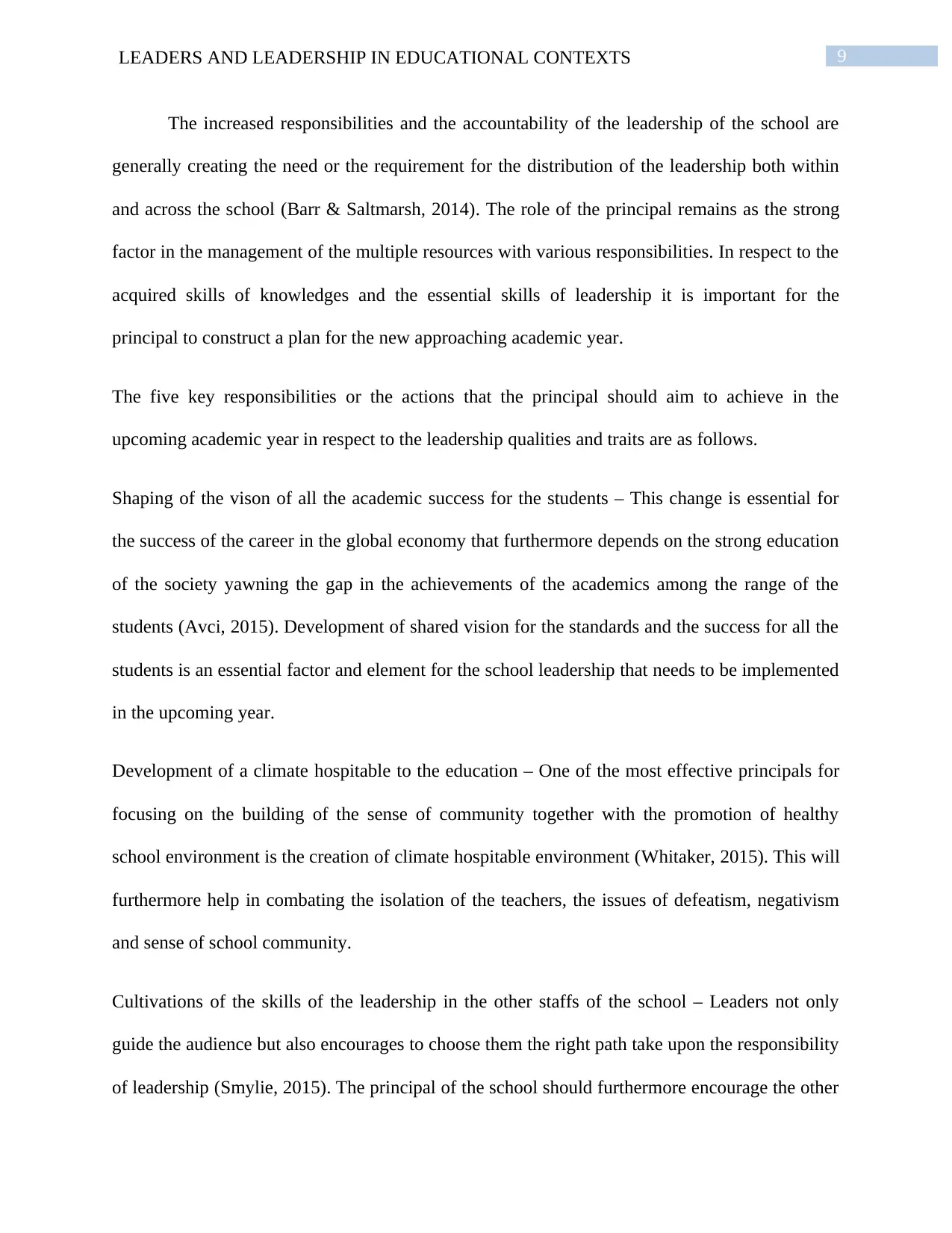
9LEADERS AND LEADERSHIP IN EDUCATIONAL CONTEXTS
The increased responsibilities and the accountability of the leadership of the school are
generally creating the need or the requirement for the distribution of the leadership both within
and across the school (Barr & Saltmarsh, 2014). The role of the principal remains as the strong
factor in the management of the multiple resources with various responsibilities. In respect to the
acquired skills of knowledges and the essential skills of leadership it is important for the
principal to construct a plan for the new approaching academic year.
The five key responsibilities or the actions that the principal should aim to achieve in the
upcoming academic year in respect to the leadership qualities and traits are as follows.
Shaping of the vison of all the academic success for the students – This change is essential for
the success of the career in the global economy that furthermore depends on the strong education
of the society yawning the gap in the achievements of the academics among the range of the
students (Avci, 2015). Development of shared vision for the standards and the success for all the
students is an essential factor and element for the school leadership that needs to be implemented
in the upcoming year.
Development of a climate hospitable to the education – One of the most effective principals for
focusing on the building of the sense of community together with the promotion of healthy
school environment is the creation of climate hospitable environment (Whitaker, 2015). This will
furthermore help in combating the isolation of the teachers, the issues of defeatism, negativism
and sense of school community.
Cultivations of the skills of the leadership in the other staffs of the school – Leaders not only
guide the audience but also encourages to choose them the right path take upon the responsibility
of leadership (Smylie, 2015). The principal of the school should furthermore encourage the other
The increased responsibilities and the accountability of the leadership of the school are
generally creating the need or the requirement for the distribution of the leadership both within
and across the school (Barr & Saltmarsh, 2014). The role of the principal remains as the strong
factor in the management of the multiple resources with various responsibilities. In respect to the
acquired skills of knowledges and the essential skills of leadership it is important for the
principal to construct a plan for the new approaching academic year.
The five key responsibilities or the actions that the principal should aim to achieve in the
upcoming academic year in respect to the leadership qualities and traits are as follows.
Shaping of the vison of all the academic success for the students – This change is essential for
the success of the career in the global economy that furthermore depends on the strong education
of the society yawning the gap in the achievements of the academics among the range of the
students (Avci, 2015). Development of shared vision for the standards and the success for all the
students is an essential factor and element for the school leadership that needs to be implemented
in the upcoming year.
Development of a climate hospitable to the education – One of the most effective principals for
focusing on the building of the sense of community together with the promotion of healthy
school environment is the creation of climate hospitable environment (Whitaker, 2015). This will
furthermore help in combating the isolation of the teachers, the issues of defeatism, negativism
and sense of school community.
Cultivations of the skills of the leadership in the other staffs of the school – Leaders not only
guide the audience but also encourages to choose them the right path take upon the responsibility
of leadership (Smylie, 2015). The principal of the school should furthermore encourage the other
Paraphrase This Document
Need a fresh take? Get an instant paraphrase of this document with our AI Paraphraser
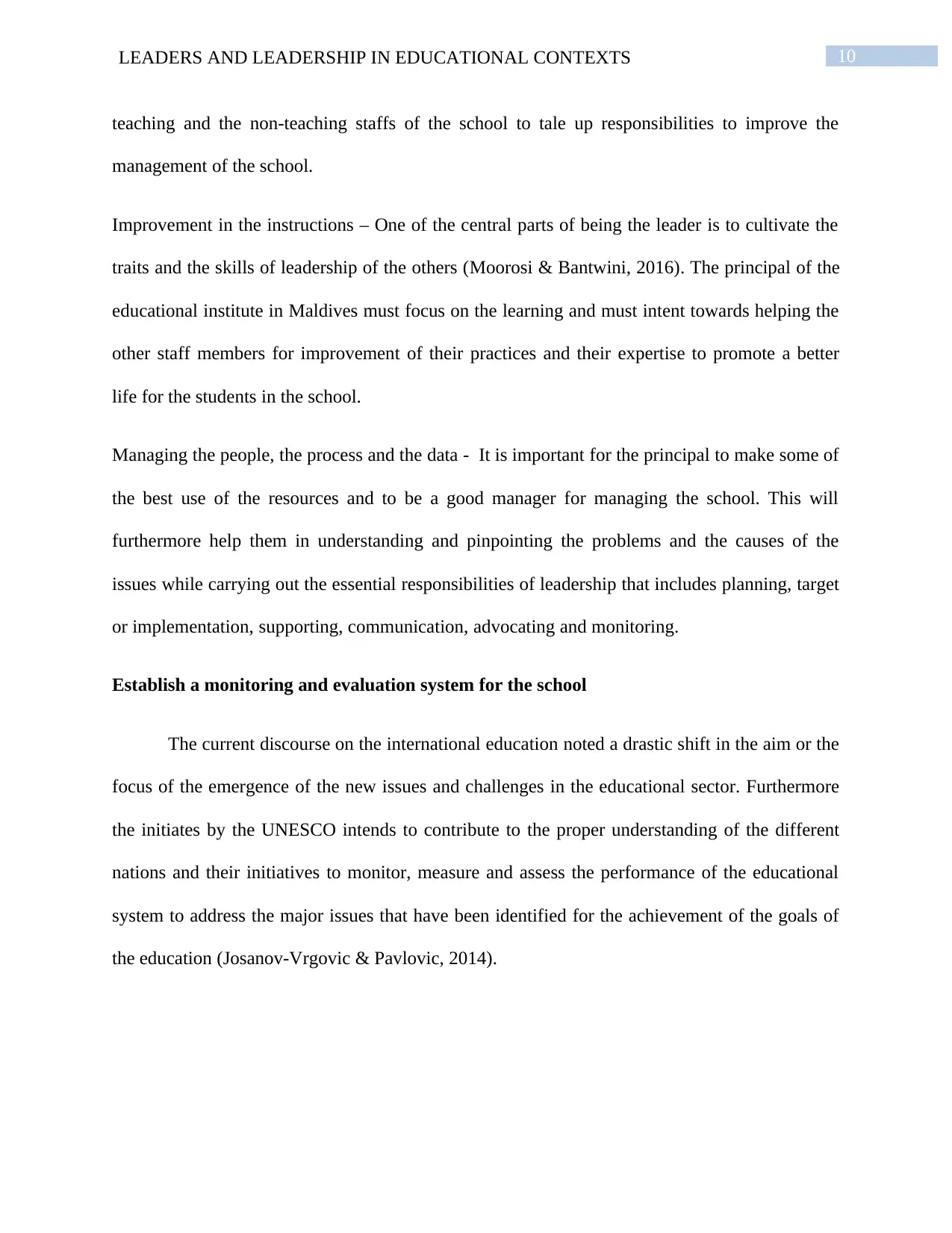
10LEADERS AND LEADERSHIP IN EDUCATIONAL CONTEXTS
teaching and the non-teaching staffs of the school to tale up responsibilities to improve the
management of the school.
Improvement in the instructions – One of the central parts of being the leader is to cultivate the
traits and the skills of leadership of the others (Moorosi & Bantwini, 2016). The principal of the
educational institute in Maldives must focus on the learning and must intent towards helping the
other staff members for improvement of their practices and their expertise to promote a better
life for the students in the school.
Managing the people, the process and the data - It is important for the principal to make some of
the best use of the resources and to be a good manager for managing the school. This will
furthermore help them in understanding and pinpointing the problems and the causes of the
issues while carrying out the essential responsibilities of leadership that includes planning, target
or implementation, supporting, communication, advocating and monitoring.
Establish a monitoring and evaluation system for the school
The current discourse on the international education noted a drastic shift in the aim or the
focus of the emergence of the new issues and challenges in the educational sector. Furthermore
the initiates by the UNESCO intends to contribute to the proper understanding of the different
nations and their initiatives to monitor, measure and assess the performance of the educational
system to address the major issues that have been identified for the achievement of the goals of
the education (Josanov-Vrgovic & Pavlovic, 2014).
teaching and the non-teaching staffs of the school to tale up responsibilities to improve the
management of the school.
Improvement in the instructions – One of the central parts of being the leader is to cultivate the
traits and the skills of leadership of the others (Moorosi & Bantwini, 2016). The principal of the
educational institute in Maldives must focus on the learning and must intent towards helping the
other staff members for improvement of their practices and their expertise to promote a better
life for the students in the school.
Managing the people, the process and the data - It is important for the principal to make some of
the best use of the resources and to be a good manager for managing the school. This will
furthermore help them in understanding and pinpointing the problems and the causes of the
issues while carrying out the essential responsibilities of leadership that includes planning, target
or implementation, supporting, communication, advocating and monitoring.
Establish a monitoring and evaluation system for the school
The current discourse on the international education noted a drastic shift in the aim or the
focus of the emergence of the new issues and challenges in the educational sector. Furthermore
the initiates by the UNESCO intends to contribute to the proper understanding of the different
nations and their initiatives to monitor, measure and assess the performance of the educational
system to address the major issues that have been identified for the achievement of the goals of
the education (Josanov-Vrgovic & Pavlovic, 2014).
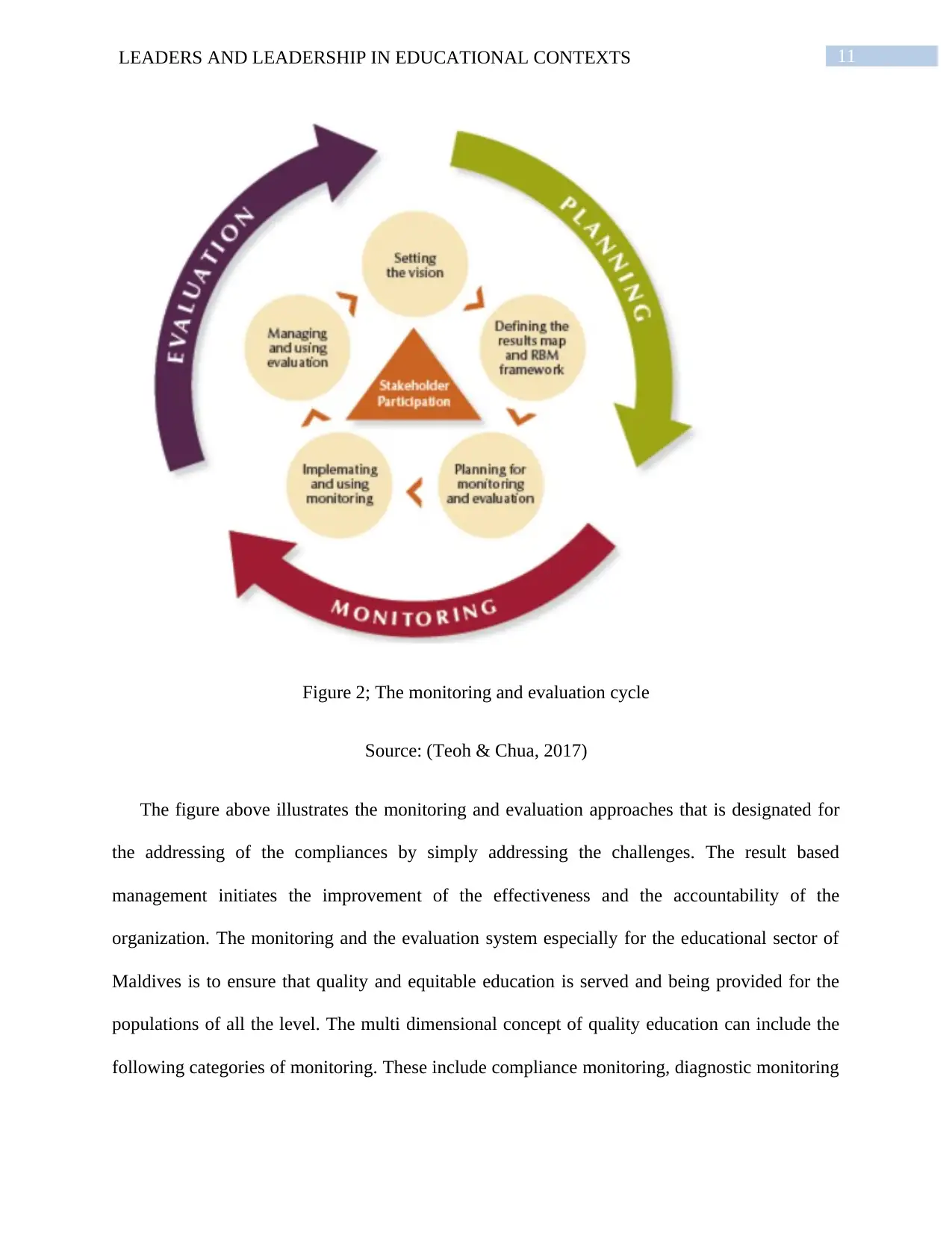
11LEADERS AND LEADERSHIP IN EDUCATIONAL CONTEXTS
Figure 2; The monitoring and evaluation cycle
Source: (Teoh & Chua, 2017)
The figure above illustrates the monitoring and evaluation approaches that is designated for
the addressing of the compliances by simply addressing the challenges. The result based
management initiates the improvement of the effectiveness and the accountability of the
organization. The monitoring and the evaluation system especially for the educational sector of
Maldives is to ensure that quality and equitable education is served and being provided for the
populations of all the level. The multi dimensional concept of quality education can include the
following categories of monitoring. These include compliance monitoring, diagnostic monitoring
Figure 2; The monitoring and evaluation cycle
Source: (Teoh & Chua, 2017)
The figure above illustrates the monitoring and evaluation approaches that is designated for
the addressing of the compliances by simply addressing the challenges. The result based
management initiates the improvement of the effectiveness and the accountability of the
organization. The monitoring and the evaluation system especially for the educational sector of
Maldives is to ensure that quality and equitable education is served and being provided for the
populations of all the level. The multi dimensional concept of quality education can include the
following categories of monitoring. These include compliance monitoring, diagnostic monitoring
⊘ This is a preview!⊘
Do you want full access?
Subscribe today to unlock all pages.

Trusted by 1+ million students worldwide
1 out of 17
Related Documents
Your All-in-One AI-Powered Toolkit for Academic Success.
+13062052269
info@desklib.com
Available 24*7 on WhatsApp / Email
![[object Object]](/_next/static/media/star-bottom.7253800d.svg)
Unlock your academic potential
Copyright © 2020–2026 A2Z Services. All Rights Reserved. Developed and managed by ZUCOL.





